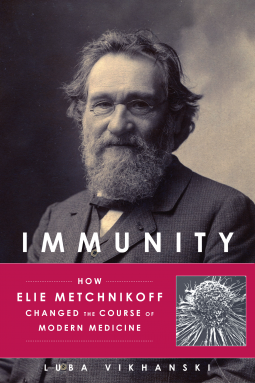
Immunity
How Elie Metchnikoff Changed the Course of Modern Medicine
by Luba Vikhanski
This title was previously available on NetGalley and is now archived.
Buy on Amazon
Buy on BN.com
Buy on Bookshop.org
*This page contains affiliate links, so we may earn a small commission when you make a purchase through links on our site at no additional cost to you.
Send NetGalley books directly to your Kindle or Kindle app
1
To read on a Kindle or Kindle app, please add kindle@netgalley.com as an approved email address to receive files in your Amazon account. Click here for step-by-step instructions.
2
Also find your Kindle email address within your Amazon account, and enter it here.
Pub Date Apr 01 2016 | Archive Date Mar 01 2016
Description
Around Christmas of 1882, while peering through a microscope at starfish larvae in which he had inserted tiny thorns, Russian zoologist Elie Metchnikoff had a brilliant insight: what if the mobile cells he saw gathering around the thorns were the same as white blood cells that traveled to the site of an injury or infection in a human or other animal? Was this some form of cellular defense? Metchnikoff's theory of immunity, that phagocytes—white blood cells—formed the first line of defense against invading bacteria would eventually earn the scientist the unofficial moniker “Father of Natural Immunity” and a Nobel Prize. But first, he had to convince his colleagues, including the skeptical Robert Koch.
Author Luba Vikhanski chronicles Metchnikoff's remarkable life, work, and discoveries in Immunity, the first modern biography of this hero of medicine. Metchnikoff was a towering figure in the scientific community of the early 20th century, a tireless humanitarian who worked to curb cholera, syphilis, and other diseases, and pioneered research into probiotics and gerontology, arguing that people could live to 150 years. His belief that sour milk might help delay aging gave rise to the modern yogurt industry. Though Metchnikoff is largely forgotten today, Vikhanski makes a compelling case that his work on natural immunity is finally receiving the attention it deserves.
Author Luba Vikhanski chronicles Metchnikoff's remarkable life, work, and discoveries in Immunity, the first modern biography of this hero of medicine. Metchnikoff was a towering figure in the scientific community of the early 20th century, a tireless humanitarian who worked to curb cholera, syphilis, and other diseases, and pioneered research into probiotics and gerontology, arguing that people could live to 150 years. His belief that sour milk might help delay aging gave rise to the modern yogurt industry. Though Metchnikoff is largely forgotten today, Vikhanski makes a compelling case that his work on natural immunity is finally receiving the attention it deserves.
Advance Praise
"A portrait that captures not only the man, but also the end-of-the-19th
century dynamism that fostered revolutions in art, politics, and
science." —Kirkus Reviews
“Elie Metchnikoff was one of the most remarkable scientists of the turn of the twentieth century, . . . an immunologist ahead of his time, and also, in some ways, very much behind it. In Luba Vikhanski he has finally found a biographer who brings his gripping story to life in sprightly, engaged prose for the English-reading world.” —Michael D. Gordin, Rosengarten Professor of Modern and Contemporary History, Princeton University
“A sensitive, nuanced portrait . . . and at times reads like a thriller.” —Siamon Gordon, Emeritus Professor of Cellular Pathology, University of Oxford, and a Fellow of the Royal Society
“Elie Metchnikoff was one of the most remarkable scientists of the turn of the twentieth century, . . . an immunologist ahead of his time, and also, in some ways, very much behind it. In Luba Vikhanski he has finally found a biographer who brings his gripping story to life in sprightly, engaged prose for the English-reading world.” —Michael D. Gordin, Rosengarten Professor of Modern and Contemporary History, Princeton University
“A sensitive, nuanced portrait . . . and at times reads like a thriller.” —Siamon Gordon, Emeritus Professor of Cellular Pathology, University of Oxford, and a Fellow of the Royal Society
Available Editions
| EDITION | Hardcover |
| ISBN | 9781613731109 |
| PRICE | $26.99 (USD) |


















